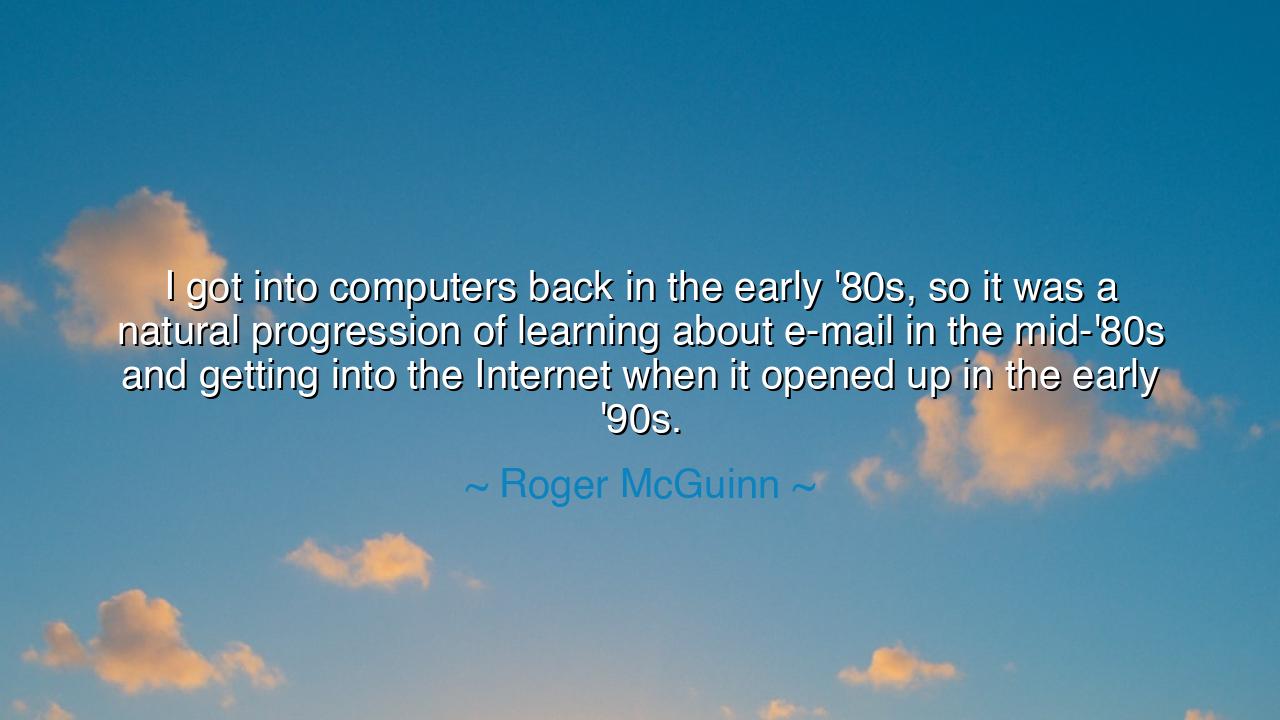
I got into computers back in the early '80s, so it was a natural
I got into computers back in the early '80s, so it was a natural progression of learning about e-mail in the mid-'80s and getting into the Internet when it opened up in the early '90s.






When Roger McGuinn said, “I got into computers back in the early ’80s, so it was a natural progression of learning about e-mail in the mid-’80s and getting into the Internet when it opened up in the early ’90s,” he was not simply recounting a personal timeline—he was bearing witness to one of the greatest revolutions in human communication. His words, simple yet profound, chart the quiet awakening of a generation that stood at the edge of the digital dawn. They capture a moment in history when the world began its transformation from isolation to interconnection, from letters and landlines to networks and invisible threads of data that now bind the earth together.
McGuinn, the frontman of The Byrds, was a pioneer not only in music but in curiosity—a man who looked at the machine and saw not complexity, but possibility. To say he “got into computers” in the early 1980s was to step into uncharted territory, when computers were not sleek instruments of daily life but mysterious devices of code and logic. Few musicians of his era would have dared to bridge art and circuitry, melody and machine. Yet McGuinn’s journey mirrors the eternal pattern of the human spirit: the urge to explore new frontiers, whether they be oceans, stars, or silicon.
His discovery of e-mail and later the Internet reflects the unfolding of collective consciousness itself. What began as personal curiosity evolved into connection, and what began as isolated machines became the beating heart of a new civilization. The Internet, in its infancy, was not a realm of noise and commerce as it is today—it was a frontier of wonder, a place where seekers, thinkers, and dreamers met across distance and time. To enter it in those early years was to feel the pulse of humanity beginning to speak as one. McGuinn, like an ancient explorer, saw the first light of this new world and stepped forward with courage and awe.
In the ancient sense, his progression was natural because it echoed the eternal law of growth: knowledge builds upon knowledge, curiosity births understanding. Those who mastered one craft—whether music, astronomy, or mathematics—were always drawn toward the next mystery. The Greeks who studied the stars became the first physicists; the monks who copied manuscripts became the first printers; and the artists who played with rhythm became the pioneers of sound technology. McGuinn’s path from strings to screens was not a departure from artistry, but a continuation of it. His quote reveals that technology, when embraced with wisdom, is not a disruption—it is an evolution of creativity.
We see this truth reflected in the story of Leonardo da Vinci, who refused to confine himself to any single discipline. Painter, inventor, anatomist, and dreamer, he sought unity in all knowledge. Had he lived in McGuinn’s age, Leonardo would have been among the first to explore computers and digital art. Both men embody the same spirit—the belief that art and science are not rivals but allies, each deepening the other. McGuinn’s early adoption of computers was an act of renaissance in itself, proving that the true artist must forever be a student of time, ready to learn the new language of creation.
Yet his words also carry a subtle lesson for all generations: to adapt is to remain alive. Those who cling to the past grow rigid and fade, but those who evolve with curiosity endure. McGuinn’s embrace of technology did not erase his roots in music—it amplified them. He saw that progress is not betrayal; it is continuity. The computer, like the guitar, is a tool of expression. What matters is not the instrument, but the imagination that commands it.
Thus, Roger McGuinn’s reflection is not just the chronicle of one man’s learning—it is a hymn to the human capacity for reinvention. From the analog hum of the 1960s to the digital symphony of the 1990s, his life traces the melody of a species forever seeking connection. His “natural progression” reminds us that history itself is a progression—each era teaching the next, each discovery lighting a new path.
Final Lesson: True wisdom is not found in resisting change, but in learning to walk with it gracefully. The tools may transform, but the soul of creation remains the same.
Practical Actions: Approach new technology with curiosity, not fear. Learn something unfamiliar each year, not to keep up with the world, but to keep your spirit alive. Use every tool—be it an instrument, a brush, or a computer—to deepen your art and your understanding. For in the rhythm of progress lies the music of eternity, and in embracing it, you join the timeless dance of human growth.






AAdministratorAdministrator
Welcome, honored guests. Please leave a comment, we will respond soon